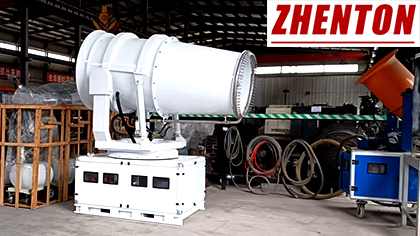Dust Is a Persistent Issue In Many
Industries,Especially in Coal Mining
and Handling.Effective Dust Control
is Crucial For Maintaining a Safe and
Healthy Environment.
Here Are The Top Ten Techniques to Prevent and
Control Dust,With a Special Focus on The Role of
Coal Fog Cannons:
1.Reduce Traffic:Minimizing The Movement of
Vehicles and Machinery Reduces The Amount
of Dust Generated.Traffic Control Can Significantly
Lower Dust Levels in Areas Prone to High Dust
Production.
2.Reduce Speed:Slowing Down Vehicle Speed on
Unpaved Roads and Surfaces Can Greatly Reduce
The Amount of Dust Kicked Up Into The Air.
Implementing Speed Limits is a Simple Yet Effective
Dust Control Measure.
3.Improve Road Design:Well-Designed Roads With
Proper Drainage and Adequate Surface Materials
Can Help Reduce Dust.Gravel or Paved Roads are
Preferable to Dirt Roads,Which Can Become Major
Dust Sources.
4.Water The Road (Palliatives-1):Regularly Watering
Roads Can Help Suppress Dust.Water Trucks Can
Be Used to Keep Surfaces Damp,Preventing Dust
Particles From Becoming Airborne.
5.Cover The Road With Gravel:Applying a Layer of
Gravel on Unpaved Roads Can Reduce Dust Emissions
By Creating a More Stable Surface That is Less Likely
to Produce Dust.
6.Increase Moisture Content of The Road Surface
(Palliatives-2): Maintaining Adequate Moisture Levels in
The Road Surface Can Help Bind Dust Particles Together,
Preventing Them From Becoming Airborne.
7.Bind The Road Particles Together (Palliatives-3):
Chemical Dust Suppressants,Such as Calcium Chloride
and Magnesium Chloride,Can Be Applied to Roads
to Help Bind Dust Particles Together,Reducing Dust
Generation.
8.Seal Unpaved Roads:Sealing Unpaved Roads With
Materials Like Asphalt or Other Binding Agents Can
Significantly Reduce Dust Emissions By Creating a
Hard,Dust-Free Surface.
What is Dust Mitigation?
Dust Mitigation Involves a Set of Practices Aimed At
Reducing or Eliminating Dust Emissions During Various
Activities, Especially Construction and Mining.Here are
Some Key Dust Mitigation Techniques:
Cover Bare Soil:Grass Or Mulch Areas That Do Not
Receive Vehicle Traffic To Prevent Dust From Becoming
Airborne.
Use Water Trucks Or Temporary Irrigation:Keeping
Haul Roads and Exposed Areas Damp Can Effectively
Reduce Dust Emissions.
Apply Dust-Retarding Products:Using Products
Specifically Designed to Reduce Dust Can Help
Control Dust Levels.
Spread Gravel Or Mulch:These Materials Can Contain
Fine Soil Particles And Prevent Them From Becoming
Airborne.
Best Solutions And Technologies For Dust Control
The Best Way To Dust Is To Use A Damp Microfiber
Cloth.Microfiber Locks In Hair And Debris,and Making
It Damp Ensures That It Will Remove The Debris And
Dirt Instead Of Pushing It Into The Air Like Regular
Dusting.
Atomised Mist Systems:These Systems Fracture Water
Into Tiny Droplets,Capturing Dust Particles More
Efficiently and Preventing Them From Becoming
Airborne.They Are Particularly Effective In Outdoor
Settings Where Dust Generation Is Continuous And High.
Effective Dusting Techniques
Dusting From The Top Down Will Not Only Prevent Dust
From Falling On Sections You Have Already Cleaned But
Will Also Ensure That You Don't Miss Any Easy-To-Forget
Areas.Begin Dusting Each Room By First Tackling Cobwebs
And Hard-To-Reach High-Up Dust Before Moving Down
To Other Areas.
Dust Control Equipment
Various Dust Control Equipment Is Available, Including:
Baghouses
Cartridge Collectors
Wet And Jet Dust Collectors
Ambient Units
Collection Booths
Downdraft Tables
Overhead Hoods
Best Dust Deterrents
Chemical Dust Suppressants Like Calcium Chloride And
Magnesium Chloride Are Highly Effective. In 2021,
Calcium Chloride Accounted For 29.5% Of The Global
Dust Control Systems And Suppression Chemicals Market.
Magnesium Chloride, Another Hygroscopic Salt, Also
Helps In Keeping Roads Moist When Applied.
Incorporating Coal Fog Cannons And The Mentioned
Techniques Can Significantly Improve Dust Control In
Coal Handling And Mining Operations. By Combining
These Strategies, Industries Can Create Safer, Healthier
Work Environments While Also Complying With
Environmental Regulations.










